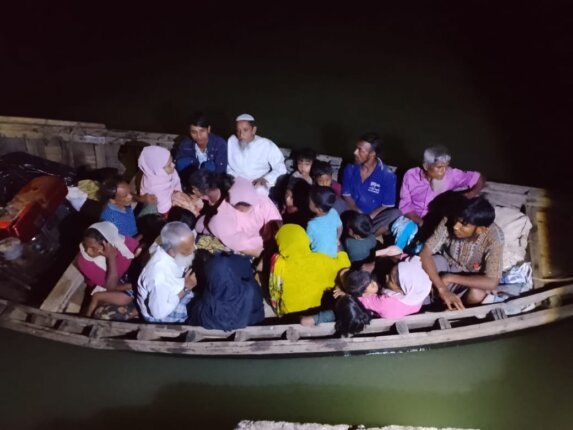The Border Guard Bangladesh (BGB) has strongly dismissed allegations made by the United League of Arakan (ULA)-the political wing of the Arakan Army (AA)-that it provides support to Rohingya militant groups such as the Arakan Rohingya Salvation Army (ARSA) and the Rohingya Solidarity Organisation (RSO). BGB officials have described these claims as “misleading propaganda” designed to deflect attention from the AA’s own abuses and internal crises.
According to the BGB, there is no evidence of collusion with ARSA or RSO. On the contrary, the paramilitary force has taken decisive action against such groups over the past several years. Several suspected members have been arrested inside Bangladesh, including ARSA’s leader Ataullah Jununi, who has long been accused of spearheading violent operations in Myanmar’s Rakhine State. By targeting these networks, BGB insists it has proven that it treats ARSA and RSO as security threats rather than partners.
BGB sources note that the collapse of Myanmar’s ceasefire in late 2023 has dramatically increased border tensions, prompting the force to expand security deployments. Patrols have been intensified along the Naf River and the remote frontier hills stretching across Bandarban and Cox’s Bazar districts. Soldiers are now stationed in strategic outposts in Ghundhum and other sensitive points, working around the clock in six-hour rotations to ensure constant vigilance.
In addition to manpower increases, BGB has reinforced its camps with new equipment and enhanced surveillance capabilities. Border patrols have been redesigned to seal off potential entry points used by smugglers, traffickers, and armed militants attempting to infiltrate Bangladesh. According to officials, these steps underscore Dhaka’s determination to prevent any spillover of conflict from Myanmar.
BGB has also stepped up operations in mine-affected areas near the frontier. Red flags now mark danger zones, and medical camps have been set up to treat victims of landmine blasts-many of which are allegedly planted by the Arakan Army itself. Financial support has also been extended to families affected by the violence, reflecting what BGB describes as a “people-centered approach” to security.
The timing of the ULA’s accusations, Bangladeshi analysts argue, reflects growing challenges within the Arakan Army’s own ranks. Reports from northern Maungdaw and Buthidaung suggest morale has eroded due to food shortages, involvement in narcotics smuggling, and disputes over looted resources. Psychological fatigue has led to desertions, with some fighters abandoning posts altogether.
One case that drew particular attention in recent weeks was the reported defection of an AA lieutenant, who allegedly crossed into Bangladesh and surrendered to authorities. While unverified independently, the incident has been cited as evidence of the group’s deteriorating cohesion.
Recruitment has also become a problem. The AA has sought to fill manpower gaps by enlisting members of other ethnic groups in Rakhine State. However, language barriers and unfamiliarity with the terrain have hampered effectiveness, creating coordination problems and operational setbacks.
At the same time, communities living under AA control-ranging from Rohingya civilians to smaller minorities such as the Mro and Tanchangya-have accused the group of extortion and intimidation. Even ethnic Rakhine families unwilling to pay so-called “taxes” have faced harassment. Many have fled across the border into Bangladesh, joining thousands of Rohingya refugees who already reside in overcrowded camps in Cox’s Bazar.
BGB has emphasized that militant infiltration across the border originates in Myanmar, not Bangladesh. Intelligence assessments indicate that ARSA and RSO cells operate from inside Myanmar, where conflict dynamics allow them to survive. The landmines planted along the border, believed to be laid by the Arakan Army, further undermine the claim that ARSA freely operates from Bangladeshi territory.
Bangladesh, officials stress, has long borne the burden of hosting over one million Rohingya refugees who fled Myanmar’s military crackdowns in 2017. Its security apparatus, including BGB, is tasked with preventing further instability while simultaneously upholding humanitarian responsibilities. “Bangladesh cannot afford to allow extremist elements to destabilize the region,” a senior BGB official noted, adding that “our mandate is clear-protect the border, assist the refugees, and maintain peace.”
Another major aspect of BGB’s operations has been combating cross-border smuggling and narcotics trafficking. Intelligence indicates that drug consignments, particularly yaba tablets, frequently enter from Myanmar. BGB has dismantled several trafficking routes and tightened river patrols to prevent narcotics from reaching Bangladeshi markets.
Officials argue that ULA’s allegations about ARSA and RSO connections are an attempt to distract from the Arakan Army’s own entanglement with criminal networks. By deflecting blame, the AA seeks to project itself as a legitimate resistance group while concealing its involvement in illicit activities, they said.
In its statement, BGB urged the international community to look beyond propaganda and focus on the root causes of instability in Rakhine State. The force called for accountability for abuses committed by all armed actors, including the Arakan Army, and emphasized the urgent need to create conditions conducive to the safe and voluntary repatriation of Rohingya refugees.
“Bangladesh has always upheld its humanitarian obligations while protecting national security,” the statement concluded. “We reject any false narratives of collusion with militants. Our approach is built on vigilance, diplomacy, and humanitarian action-not alliances with extremists.”
As the conflict in Rakhine intensifies and accusations fly across the border, Bangladesh finds itself balancing two critical priorities: safeguarding its frontier against infiltration and maintaining its humanitarian commitment to more than a million displaced Rohingya. For BGB, the task is not only to secure the border militarily but also to challenge narratives that seek to undermine its credibility.
While ULA’s accusations have sparked debate, ground realities suggest that Bangladesh remains committed to containing extremist threats rather than enabling them. In the complex security environment of the Bangladesh–Myanmar frontier, vigilance continues to be the defining principle of BGB operations.



